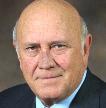STATEMENT BY FORMER PRESIDENT FW DE KLERK ON THE DEATH OF BARONESS THATCHER
I am honoured to have been invited to London by the British Government and the Thatcher family to attend the funeral of Baroness Thatcher. She will be remembered not only as one of Britain's greatest Prime Ministers but also as a leader whose policies and approach had a significant impact on politics throughout the world.
Baroness Thatcher played a constructive role in the promoting evolutionary change in South Africa throughout her period as Prime Minister.
She was a steadfast critic of apartheid and consistently urged the South African government to release Nelson Mandela and to embark on fundamental constitutional change. However, she had a much better grasp of the complexities and geo-strategic realities of South Africa than many of her contemporaries. She realised that there would be no peaceful solution to the problems of South Africa unless the reasonable concerns of all South Africans - including whites - were taken into consideration.
She was sceptical about the ability of sanctions to force the South African government to adopt changes that it believed would threaten its core interests.
She also believed that more recognition should be given to the reforms that had been initiated by President PW Botha. Genuine trade union rights were extended to black workers in the early 80s; by 1983 coloured and Indian South Africans had been included in the tricameral parliament; and by 1986 more than 100 apartheid laws had been repealed. By 1987 the National Party had accepted that black South Africans would have to be accommodated within the same constitutional system as whites - and there was intense debate on how this should be achieved.
However, the only response to these reforms was redoubled pressure for comprehensive sanctions - particularly from Commonwealth countries.
Margaret Thatcher was annoyed by the hypocrisy of many of those who were calling the loudest for sanctions. She pointed out that the frontline states had extensive economic ties with South Africa that they had no intention of breaking. Also, many of the states involved had worse human rights records than South Africa. She also noted that the main victims of sanctions were invariably black South African workers.
These convictions led her to oppose the imposition of comprehensive sanctions against South Africa at the Nassau, Vancouver and Kuala Lumpur meetings of the Commonwealth Heads of Government. She stood her ground, despite vitriolic and personal attacks.
The stand she took on sanctions helped to buy time for South Africa until the major geostrategic changes at the end of the 1980s. By 1989 the situation was much more conducive to successful constitutional negotiations: all sides had reached the conclusion that negotiations presented the only option for the future; the Namibian independence process had been successfully implemented and the collapse of international communism had substantially reduced the threat posed by the South African Communist Party's symbiotic relationship with the ANC.
After I became leader of the National Party in 1989 I visited London and informed Prime Minister Thatcher of my intention to embark on fundamental constitutional reform. From that meeting onward and throughout the rest of her tenure as Prime Minister, she gave strong and valued to support to me and to all other leaders who were working for a peaceful, prosperous, and constitutional future for South Africa.
After her retirement in 1993 Baroness Thatcher accepted my invitation to visit South Africa as an official guest of my government. During her visit I bestowed upon her the Order of Good Hope, the highest honour that South Africa could then award to any non-South African. I can think of no-one who was more deserving of such recognition.
Subsequently - and before her stroke in 2002 - we met many times in the Cape and in London. I am honoured to have had Margaret Thatcher as a friend.
LONDON, 16 APRIL 2013
Issued by the FW de Klerk Foundation, April 16 2013
Click here to sign up to receive our free daily headline email newsletter

